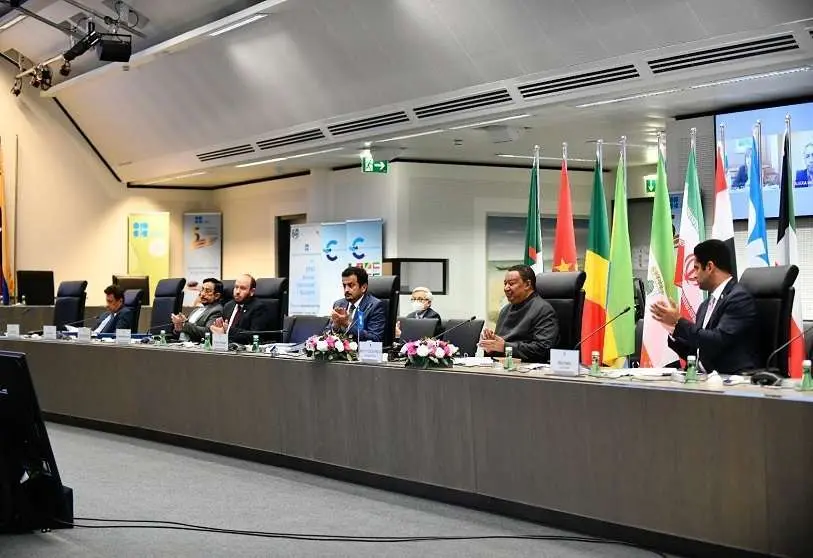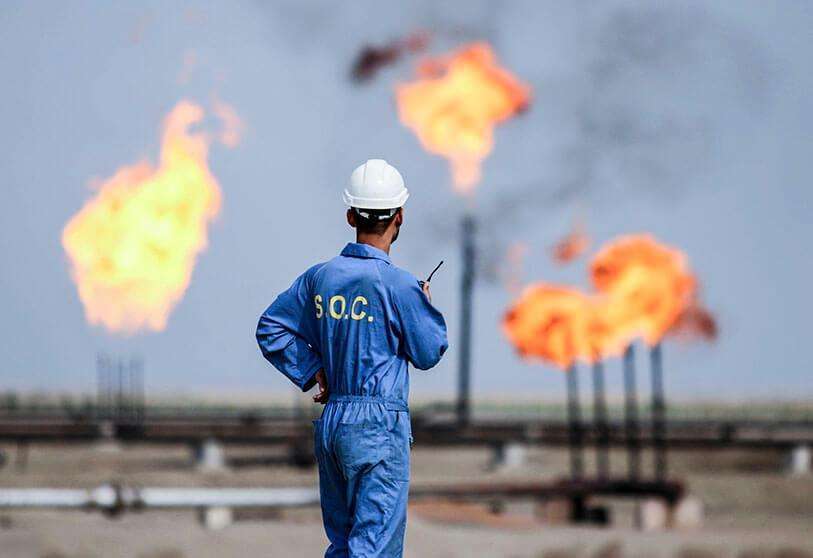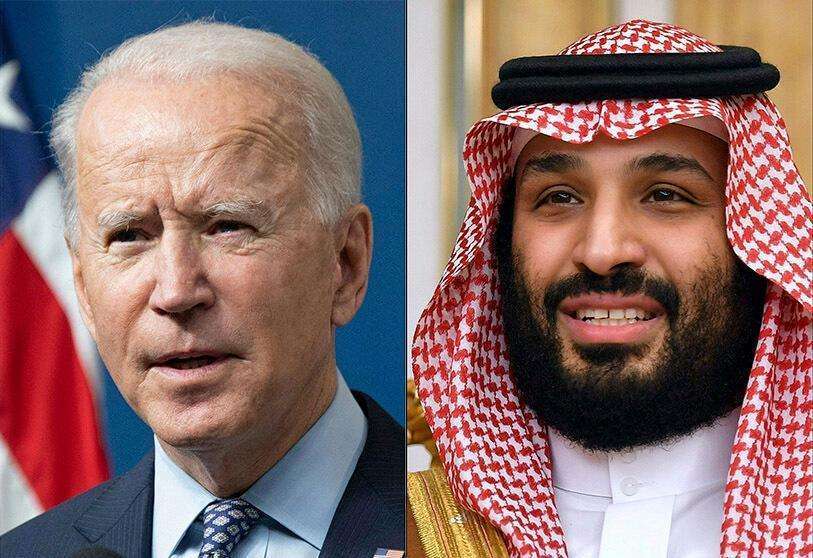OPEC+ increases oil production by 50% and eases global supply crisis

The oil crisis caused by COVID-19 and aggravated by the war in Ukraine reached a turning point on Thursday. The member states of the Organisation of Petroleum Exporting Countries (OPEC), which control 40% of the world's crude oil production, discussed the establishment of a new policy within the framework of the harmful sanctions promoted by the European Union against Russia, a leading member of the organisation, for its bloody campaign in the former Soviet republic.
At 2 p.m., an OPEC+ video conference summit, led by Saudi Arabia, began and lasted until 3.30 p.m. Two options were on the table: the first, to continue with the policy of tight production, a measure in force since the pandemic that has caused prices to rise; the second, to opt for a sustained increase in production in order to ease the markets and alleviate, in part, the economic crisis that has run amok as a result of the Russian invasion of Ukraine.
Little change was expected until a few hours ago. Analysts assumed that the elite club, whose dominant market position has allowed it to operate "like a cartel, coordinating production levels among members to manipulate world oil prices", as Council of Foreign Relations (CFR) economics editor Anshu Siripurapu points out in a recent article, would extend the tight production policy that has made its members economically profitable.

But Saudi Arabia, the organisation's leader, said it was willing to increase oil production. And so it has. OPEC+ has decided to "bring forward the global production adjustment scheduled for September and redistribute the 0.432 million barrels per day production increase evenly between July and August 2022". July production will be set at 648,000 barrels per day, 50% more than what was being produced to date, according to the communiqué issued by the organisation at the end of the meeting.
"The meeting took note of the most recent reopening of shutdowns in major global economic centres. It was also noted that global refinery consumption is expected to increase after seasonal maintenance. The meeting stressed the importance of stable and balanced markets for both crude oil and refined products," OPEC+ said.
The decision comes in response to Russia's plummeting output as a result of the sixth and final round of sanctions adopted this week by the European Commission. The EU executive pushed through a new package containing a partial embargo on Russian seaborne gas by the end of the year, with exceptions for land-based sources. Two-thirds of European imports.
The Wahhabi kingdom took the decision a day after oil prices hit a new all-time high. Brent crude oil rose to over $123 a barrel, the highest level in two months, in response to sanctions against Moscow, which also included an agreement with the UK to ban the insurance of Russian oil tankers. Such a move would hamper the Kremlin's ability to redirect supplies to other regions and markets.

Rising prices once again set off alarm bells around the world about a possible global supply shortage, as Russia produces more than 10% of the world's oil, or at least it did, until Vladimir Putin ordered an invasion of Ukraine. Since then, Russian production has reportedly fallen by one million barrels per day. Sanctions appear to have hit the Russian economy right at its waterline, according to Reuters.
Oil prices have only risen over the past year. In fact, since 2021 they have doubled. A fact that has raised some hostility from the international community against OPEC+ members, especially against Gulf countries such as the Emirates or Saudi Arabia, which, with their decisions, have allowed this exponential growth despite having spare production capacity.
The 'desert kingdom' now believes that it should keep in reserve the remaining volume of production that it has not exploited to date. Riyadh's change of stance has led to lower prices. However, the gradual lifting of the blockades imposed by China since the pandemic has also stimulated this market reaction.
"The beauty of the Opec+ deal is that Russia is onboard," Bader Al-Saif, assistant professor at Kuwait University, tells Atalayar. "This is partly the case due to Russia’s faltering oil output. The increase is also needed to accommodate Chinese reopening after its latest Covid surge."
"Prices may not drop much plus not all producers can meet their capacity. So the change is not as drastic. Saudi was able to simultaneously balance US and Russian concerns," Al-Saif stresses.
Brent crude has fallen by 2.4% in the last few hours to stabilise at approximately 120 dollars. In this scenario, Russia has been left with no choice but to accept that the rest of the OPEC+ members increase their production to balance their contribution, but without compensating for the entire deficit, according to Reuters. The perception of Saudi Arabia, whose representatives do not believe there is a real risk of a supply crisis, would facilitate this exit.
The 41st JMMC Meeting, held via videoconference, has concluded. It was chaired by HRH Prince Abdul Aziz Bin Salman, Saudi Arabia’s Minister of Energy, and Co-Chair HE Alexander Novak, Russian Deputy Prime Minister. pic.twitter.com/GKE56ZkZGT
— OPEC (@OPECSecretariat) June 2, 2022
In the midst of the COVID-19 pandemic, OPEC+ members, including Moscow, agreed to restore monthly production by 400,000 barrels per day in order to maximise profitability. A figure that, as of Wednesday, was to be maintained. But Riyadh had not yet said the last word.
The G7 Finance Ministers demanded last week at a summit in Germany that OPEC+ pump more oil against the backdrop of a war, marked by a price rise unprecedented in the last 10 years. "We call on oil and gas producing countries to act responsibly and respond to the tightening of international markets, noting that OPEC has a key role to play," the leaders said in a statement.
Tensions have increased exponentially between the US and Saudi Arabia. The Biden administration has been pressuring Riyadh for months to ramp up production immediately as a result of its energy dependence on the group. The pressure reportedly came from the highest levels, reaching Saudi Arabia's crown prince and 'de facto' ruler, Mohammed bin Salman.

The Saudi leader, known as MBS, had so far maintained his refusal to Washington. The Wahhabi kingdom maintains the United States as a preferred partner despite frictions with the current administration, but at the same time wants to preserve its ties with Moscow and the rest of the non-OPEC producers, with whom it agrees on prices. But it does not want a rise in those same prices to trigger a recession.
The moves by Brett McGurk, the White House coordinator for Middle East policy, and Amos Hochstein, the White House energy envoy, had served to loosen relations, according to the Financial Times. That would explain why Riyadh has adopted this change of stance and unblocked the OPEC+ production increase.
"The KSA-US partnership is historic and has endured many hurdles simply because both sides need one another. Much is said about tensions in the relationship and this is normal in any bilateral relation. But it has never reached a point of no return," notes Bader Al-Saif. "This is lately evidenced in Saudi willingness to increase oil output while the US has reaffirmed its support for Saudi security and openness of Biden to work with de facto ruler MBS. This breakthrough paves the way for a Biden visit to KSA where the relations will be on a more steady course thereof".
The Wall Street Journal reported on Wednesday a possible suspension of the OPEC+ supply deal with Russia. But Reuters denied the report, quoting sources within the organisation as saying that the idea has not even been discussed. Saudi Arabia's Energy Minister Prince Abdulaziz bin Salman, the crown prince's half-brother, stressed that Russia is a key partner in the alliance.
Americas Coordinator: José Antonio Sierra








